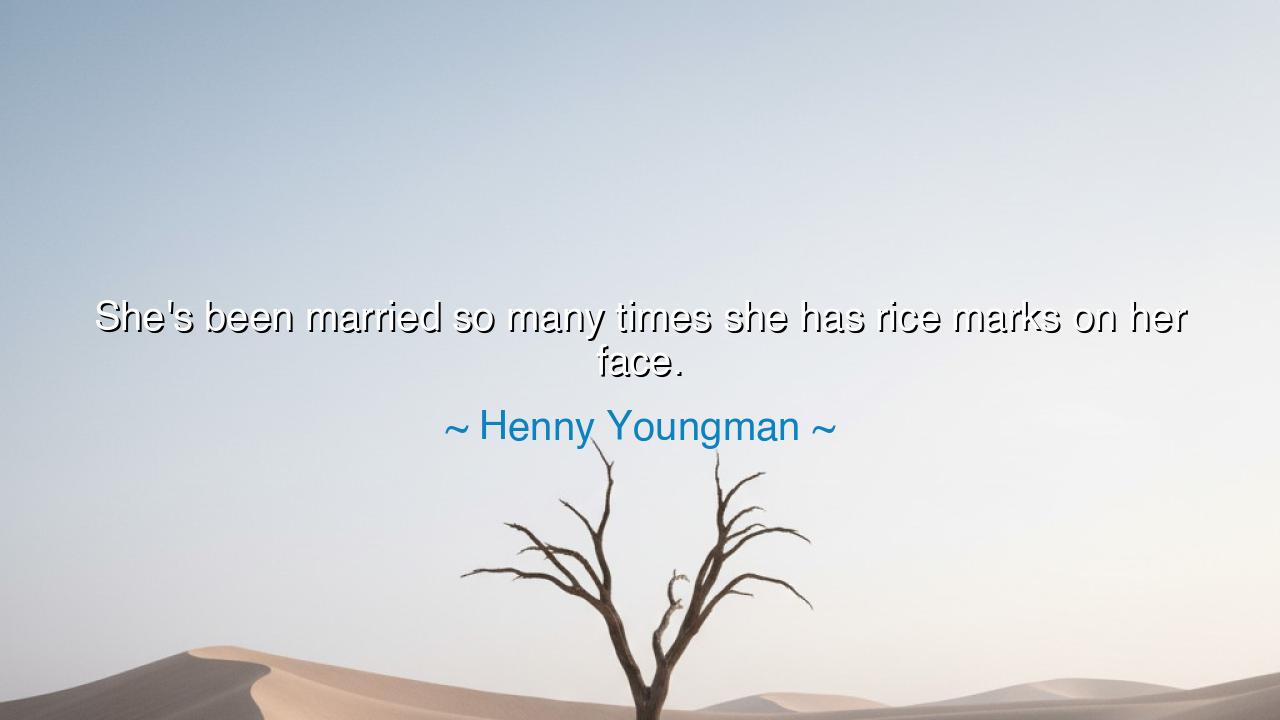
She's been married so many times she has rice marks on her face.






Hear now, the clever and enduring words of Henny Youngman, the king of one-liners, who once jested: “She’s been married so many times she has rice marks on her face.” At first, these words may stir laughter, as they were meant to—for Youngman’s art was humor, quick and piercing. Yet beneath the jest lies the deeper echo of human nature itself. For in his wit is hidden a reflection of the endless dance between love, hope, and folly—the cycle of trying, failing, and trying again that defines the human heart.
In the old days, when a bride and groom emerged from the chapel, it was the custom to throw rice—a symbol of prosperity, fertility, and good fortune. The act was joyous, a wish that love might take root and grow. Thus, when Youngman quipped that a woman had “rice marks on her face,” he was not only making light of her many marriages but also, perhaps unknowingly, commenting on the eternal resilience of the human heart. Each handful of rice represents another beginning, another dream renewed despite past sorrows. What seems comic becomes, upon reflection, almost heroic.
Henny Youngman, like the jesters of the ancient courts, used laughter to reveal truth. His humor was the kind that could make the proud humble and the weary wise. In this line, he speaks to the persistence of those who continue to seek love no matter how many times it has disappointed them. Though wrapped in jest, the quote carries the gentle sting of reality—that marriage, that most sacred of covenants, can become a ritual repeated without wisdom, a ceremony of hope that too often forgets the hard work of devotion.
Consider the story of Zsa Zsa Gabor, the glamorous actress who was married nine times. The world mocked her for it, but she once said with a wry smile, “I am a marvelous housekeeper. Every time I leave a man, I keep his house.” Beneath her glittering humor was the same truth Youngman’s joke captures: that some souls, in their longing for connection, mistake romance for fulfillment, ceremony for love. Yet who can truly judge them? For even the wisest have chased illusions, believing that perhaps the next time would be the one that lasts.
There is wisdom, too, in the laughter. Youngman’s jest reminds us that love, without reflection, becomes repetition. To marry again and again without growth is to walk the same path expecting a different horizon. And yet—there is also grace in persistence. For the one who still believes in love after heartbreak carries within them a spark of divine hope. The danger lies not in the number of unions, but in forgetting the lessons each one brings. Laughter, then, is not cruelty—it is a mirror. It teaches us to see our folly without despair, to smile even as we learn.
From this humor, we draw a lesson as timeless as the rice that falls upon every bride: Love must be planted, not merely celebrated. Ceremony fades, but character endures. One may marry once or many times, yet true union is born only of patience, humility, and understanding. Before seeking the next partner, seek first to understand the self. For the marks that matter most are not the rice upon the skin, but the wisdom etched upon the soul.
Therefore, my children of the heart, laugh kindly at the follies of love, but learn from them. When you find yourself mocked by life’s humor, smile as Youngman did, and let laughter become your teacher. Love bravely, but not blindly; begin again, but never without growth. For even in jest, there is the wisdom of ages: that to laugh at our mistakes is to rise above them, and that the soul which can laugh, forgive, and try once more is never truly defeated.
So when you hear the words, “She’s been married so many times she has rice marks on her face,” let them remind you of this truth: humor is the gentlest wisdom, and love—though fragile and foolish—is still the bravest act of all.






AAdministratorAdministrator
Welcome, honored guests. Please leave a comment, we will respond soon